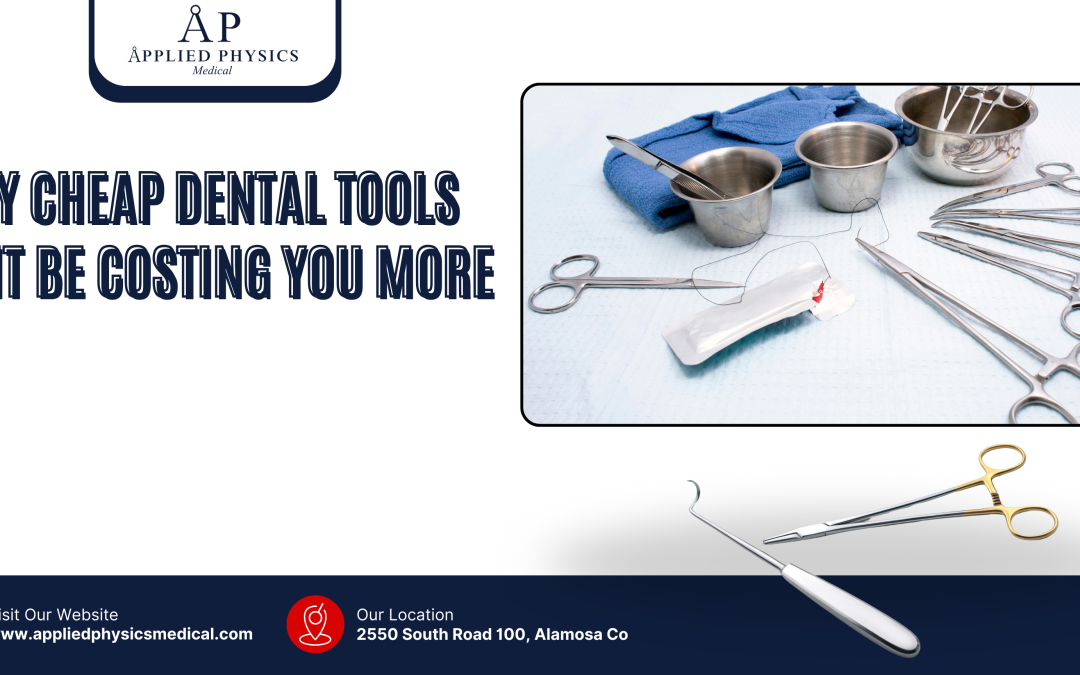Introduction
When it comes to dental tools, many practitioners may be tempted to opt for cheaper options to save money. However, what they may not realize is that the hidden costs of using cheap dental tools can end up costing them more in the long run. While the initial cost of cheap dental instruments may seem appealing, the quality and durability of these tools are often compromised, leading to frequent replacements and repairs.
This not only adds up in terms of financial costs but also in terms of time and effort spent on constantly replacing and fixing tools. In addition, the use of cheap dental tools can also lead to subpar patient care, which can have long-term consequences for both the patient and the practice. Furthermore, the hidden costs of cheap dental tools extend beyond just the financial aspect.
The use of low-quality instruments can also impact the reputation of the dental practice, as patients may perceive the use of cheap tools as a sign of substandard care. This can lead to a loss of trust and credibility, which can be detrimental to the success of the practice in the long run. Therefore, dental practitioners need to consider the hidden costs of using cheap dental tools and invest in high-quality instruments that will ultimately save them time, money, and their reputation.
Key Takeaways
- Cheap dental tools may initially save money but can end up costing more in the long run due to hidden costs and risks.
- The hidden costs of cheap dental tools include frequent replacements, repairs, and potential patient complications.
- Quality dental tools are important for ensuring accurate and effective dental procedures.
- Using cheap dental instruments can pose risks such as infection, injury, and compromised patient care.
- Investing in quality dental instruments is essential for better patient outcomes and long-term financial savings.
The Importance of Quality Dental Tools
Quality dental tools are essential for providing effective and efficient dental care. From basic instruments such as mirrors and probes to more complex tools like handpieces and ultrasonic scalers, the quality of these instruments directly impacts the quality of patient care. High-quality dental tools are designed to be durable, reliable, and precise, allowing practitioners to perform procedures with accuracy and confidence.
This not only ensures better outcomes for patients but also enhances the overall experience for both the practitioner and the patient. In addition, quality dental tools are also designed with the latest technology and ergonomic features, which can improve efficiency and reduce the risk of injury or strain for the practitioner. This can lead to a more comfortable and productive work environment, ultimately benefiting both the practitioner and the patient.
Furthermore, high-quality dental instruments are often backed by warranties and customer support, providing peace of mind for practitioners and ensuring that they are able to provide consistent and reliable care to their patients. Overall, the importance of quality dental tools cannot be overstated, as they are essential for delivering safe, effective, and high-quality dental care.
The Risks of Using Cheap Dental Instruments
While the initial cost savings of using cheap dental instruments may seem appealing, the risks associated with these tools can far outweigh any potential benefits. Cheap dental instruments are often made with inferior materials and manufacturing processes, which can lead to a range of issues such as corrosion, breakage, and poor performance. This can compromise the safety and effectiveness of procedures, putting both the practitioner and the patient at risk.
In addition, the lack of precision and reliability in cheap dental tools can lead to errors and complications during procedures, which can have serious consequences for patient care. Furthermore, the use of cheap dental instruments can also impact the overall efficiency and productivity of the practice. Constantly having to replace or repair tools can lead to downtime and disruptions in patient care, ultimately affecting the bottom line of the practice.
In addition, the frustration and inconvenience of dealing with low-quality instruments can also take a toll on the morale and satisfaction of the dental team. Therefore, it is important for practitioners to consider the risks associated with using cheap dental instruments and prioritize the safety and well-being of their patients by investing in high-quality tools.
How Cheap Dental Tools Can Impact Patient Care
| Issue | Consequence |
|---|---|
| Poor Quality Tools | Increased risk of injury or damage to teeth |
| Short Lifespan | More frequent replacements needed |
| Ineffective Results | Higher chance of dental issues going unnoticed |
The use of cheap dental tools can have a direct impact on the quality of patient care. Inferior materials and construction in cheap instruments can lead to issues such as rough edges, poor ergonomics, and inconsistent performance, all of which can compromise the safety and effectiveness of procedures. This can result in discomfort or even injury for patients, as well as suboptimal outcomes for their dental treatment.
In addition, the lack of precision and reliability in cheap dental tools can lead to errors and complications during procedures, which can have serious consequences for patient care. Furthermore, the use of cheap dental instruments can also affect the overall patient experience. Patients may perceive the use of low-quality instruments as a sign of substandard care, leading to a loss of trust and confidence in the practitioner.
This can ultimately impact patient satisfaction and retention, as well as the reputation of the practice. Therefore, it is crucial for practitioners to prioritize the quality and reliability of their dental tools in order to ensure that they are able to provide safe, effective, and high-quality care to their patients.
Long-Term Financial Impact of Using Cheap Dental Tools

While cheap dental tools may seem like a cost-effective option in the short term, they can have significant long-term financial implications for dental practices. The frequent need for replacements and repairs of cheap instruments can add up in terms of costs, ultimately outweighing any initial savings. In addition, the downtime and disruptions caused by dealing with low-quality tools can also impact the productivity and profitability of the practice.
This can result in lost revenue and increased expenses, ultimately affecting the financial health of the practice. Furthermore, the use of cheap dental instruments can also impact the overall efficiency and effectiveness of procedures, leading to potential complications or rework that can further add to costs. In addition, the potential for patient dissatisfaction or even legal issues resulting from substandard care can also have financial implications for the practice.
Therefore, it is important for practitioners to consider the long-term financial impact of using cheap dental tools and prioritize investment in high-quality instruments that will ultimately save them time, money, and reputation.
Investing in Quality Dental Instruments for Better Patient Outcomes
Investing in quality dental instruments is essential for ensuring better patient outcomes. High-quality tools are designed to be durable, reliable, and precise, allowing practitioners to perform procedures with accuracy and confidence. This not only ensures better outcomes for patients but also enhances the overall experience for both the practitioner and the patient.
In addition, quality dental instruments are often backed by warranties and customer support, providing peace of mind for practitioners and ensuring that they are able to provide consistent and reliable care to their patients. Furthermore, high-quality dental tools are also designed with the latest technology and ergonomic features, which can improve efficiency and reduce the risk of injury or strain for the practitioner. This can lead to a more comfortable and productive work environment, ultimately benefiting both the practitioner and the patient.
Overall, investing in quality dental instruments is crucial for delivering safe, effective, and high-quality dental care that prioritizes patient safety and well-being.
Finding Affordable, High-Quality Dental Tools
While high-quality dental instruments may come with a higher price tag, there are affordable options available that do not compromise quality. Practitioners need to research and compare different brands and suppliers to find affordable options that meet their needs. In addition, purchasing from reputable suppliers that offer warranties and customer support can provide peace of mind and ensure that practitioners can provide consistent and reliable care to their patients.
Furthermore, practitioners can also consider options such as leasing or financing high-quality dental instruments to spread out costs over time. This can make it more feasible for practices to invest in quality tools without having to make a large upfront investment. In addition, some suppliers may offer discounts or promotions on high-quality instruments, making it more affordable for practitioners to upgrade their tools.
Overall, finding affordable options for high-quality dental instruments is crucial for ensuring that practitioners are able to provide safe, effective, and high-quality care to their patients without compromising their financial stability.
Conclusion
While cheap dental tools may seem like an attractive option for saving money, they often lead to higher costs in the long run. Poor-quality instruments can result in frequent replacements, increased maintenance expenses, and compromised patient care. Additionally, using subpar tools may negatively impact treatment outcomes, leading to potential liability issues and lost revenue due to dissatisfied patients. Investing in reliable, high-quality dental tools ensures better performance, longevity, and ultimately, the success of dental practices. Therefore, prioritizing quality over initial cost can significantly enhance both operational efficiency and patient satisfaction.

